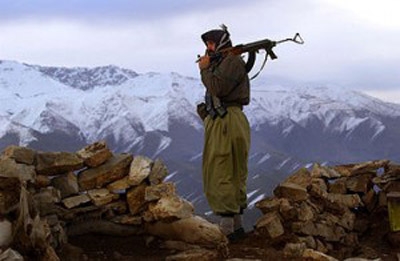Opinion: ‘For Turkey and its Kurds, endgagame is out of reach’
April 15, 2015
From Media

“The dice just roll one way for us — and that is a 6-6,” a Kurdish politician commented over glasses of tea a few months ago.
He was referring to the luckiest score in backgammon, the Middle East’s traditional pastime. But specifically, he was talking about negotiations between Turkey and the outlawed PKK, the Kurdistan Workers Party, which has paused its guerrilla war against Turkey in the expectation of a political settlement.
Nearly 40,000 people are estimated to have been killed in the conflict, which has raged for nearly four decades, largely in Turkey’s southeast.
The politician was echoing increased self-confidence among Kurds across Turkey, Iraq and Syria that after a century of hardship and statelessness, now is their time. But what is the endgame and how do they get there?
The mediation process between Turkey and the PKK, which started in 2012, has been painful and a political settlement remains uncertain.
Isolated and imprisoned on an island south of Istanbul, Abdullah Öcalan, the PKK’s 67-year-old leader, is the armed group’s main negotiator with the Turkish government on peace talks.
But he cannot communicate directly with his commanders or the several thousand guerrillas spread across eastern Turkey and northern Iraq.
Instead, he writes a letter once a month and hands it to a delegation of parliamentarians from the pro-Kurdish party, who then travel to a mountainous hide-out on the Iran-Iraq border to give it to PKK commanders.
The principle governing talks with the Turkish government is “politics for peace”, based on the hope that the PKK would enter legitimate politics in return for laying down arms.
It is also agreed in principle between the two that there would be a general amnesty and Turkey would undertake administrative reform by giving more autonomy to local governments across the country — not just Kurdish areas.
But with decades of mistrust and Turkey’s never-ending electoral cycles, progress has been slow.
For the PKK, the release of Mr Öcalan is a priority. But for President Recep Tayyip Erdoğan, the ultimate solution would be part of a larger vision, involving a new constitution and an overhaul of Turkey’s parliamentary system towards what he calls a “Turkish-style presidency” — in this case, giving himself executive powers.
For Mr Erdoğan and his governing AKP, the general elections in June and the rise of Turkish nationalist sentiment among the Anatolian electorate require a more cautious approach in the talks.
For the Kurds, the negotiations also involve an inherent problem, because the two sides are simultaneously partners in peace and rivals in politics.
Since the anti-government Gezi Park protests of 2013, Turkey’s pro-Kurdish political party has been gaining ground among Turkey’s secular liberals and young dissidents as the new bastion of anti-AKP sentiment. While the PKK is in talks with the government, Selahattin Demirtaş, the young leader of the pro-Kurdish People’s Democracy Party, the HDP, has been gaining popularity as an effective critic of Mr Erdoğan.
For decades, various PKK-backed political parties remained roughly at 6.5 per cent in polls. But the 42-year-old former human rights activist managed to score almost 10 per cent in the presidential elections last summer, running against Mr Erdoğan.
In the forthcoming June election, Mr Demirtaş is pushing to pass the 10 per cent national threshold for a seat in parliament — one of the highest in the world — and needs the support of both disgruntled secular Turks and conservative Kurds, who have so far leaned towards the AKP.
Therein lies the problem.
When Mr Demirtaş vowed “we will never allow you [Mr Erdoğan] to become an executive president” in parliament in March, he received praise from secular commentators, but the statement was enough for Mr Erdoğan to halt the negotiations with Mr Öcalan.
Regional dynamics beyond Turkey’s borders also affect the peace process. The PKK (through its Syrian affiliate) has been fighting jihadis along Turkey’s southern border for the past two years. The fact that the PKK now makes up a section of the ground offensive against Isis in Iraqi Kurdistan and Syria makes it difficult to imagine a complete disarmament, which is the basic tenet of the potential deal with Turkey.
PKK commanders are willing to lay down arms inside Turkey once there is a deal, but would continue as a regional force in Iraq and Syria.
This all makes a Turkish-Kurdish deal inside Turkey more complicated.
Mr Erdoğan was bold in starting peace negotiations, but a Kurdish deal is now tangled up with his ambitions. Both sides would prefer peace, but they also benefit from tackling one another, in politics and on the street.
Aslı Aydıntaşbaş is a Turkish columnist and political commentator
The Financial Times











